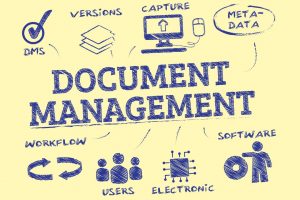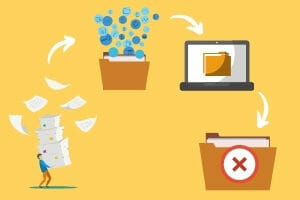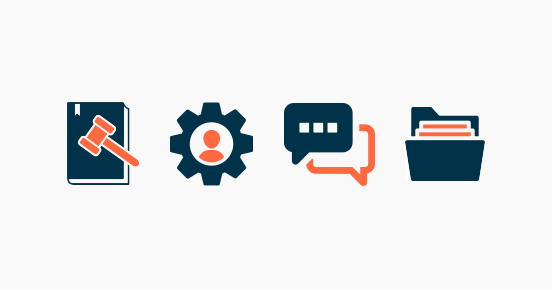Office Organization
Become a more effective office organizer. From electronic records retention policies to controlling document management and more, the techniques provided by Business Management Daily will get you organized – and get you noticed.
Should we have a records retention plan?
Every employer must first comply with the Federal Trade Commission’s records disposal rule, designed to protect employees from falling prey to identity theft. The rule stipulates that you must “reasonably” destroy paper and electronic records containing identifiable data on job applicants and employees, such as Social Security numbers and credit histories. If you don’t properly destroy this data after its statutory retention period expires, you’ll face hefty penalties.
A records retention schedule ensures that your organization keeps the records it needs for operational, legal, fiscal or historical reasons, and then destroys them when they’re no longer useful. You may base your records retention schedule on your own experience, research of legal mandates and what other companies are doing.
How long should we keep various types of records?
That really depends on what department the records are in, and the type of record. For example, how long to keep personnel records differs from 3 years for applications, to permanently for paychecks and pension plans.
How can we protect our digital and online records?
Get with your IT department or resource to work out a plan. Here are some things to consider when figuring out a plan for how to protect your company records:
- IT should define the types of denial-of-service attacks so a website’s odd behavior is not a total shock. Ask for specifics.
- Who would get the alarm, and how? You should be able to sleep at night knowing that in a worst-case scenario, there’s no instance in which IT would not wake up to the threat within minutes.
- How long would it take to restore everything from backup? What if IT tells you it’s going to be six days before all systems are back online? Or 12? Or that server content has to be stitched back together in a way that will slow you down for weeks? How physically protected are our servers? In case of a physical disaster—storm, flood or even a break-in—have someone assure you that there’s nothing more that can be done to reinforce air conditioning systems, get machinery off the floor or secure locks and passcodes. Data security often comes down to building tangible things that are tough to break.
Help! How do I organize my work inbox?
Opening your email to find that yet another 15 have piled up can lead to more stress and procrastination. Set up your inbox so that a single swift click can delete useless newcomers out of existence; work those reflexes! Try these tips:
- If an email will take more than five minutes to deal with, drag it to a different folder. It’s a good way to get a visual on your ever-mounting tasks.
- Develop a color scheme for flags, using two or three different colors. Even if your inbox is full, you’ll be able to spot the hottest items.
- Know which emails lead to ever more of them. Avoid writing emails to argue complex points, disagree, apologize, criticize or describe processes in detail, or emails that need to be phrased carefully to spare feelings. Don’t get caught in back-and-forths that can be resolved more quickly in person.
- Take time to unsubscribe. You’re on too many email lists – regularly dump the ones that aren’t absolutely necessary.
What are the most efficient ways to hold meetings?
Start by setting it up smart – limit attendees to those who only need to participate, time it right (it doesn’t have to be 30 minutes or an hour) and create an agenda.
Think about some ways to start the meeting to spark the conversation. Possible questions to kick off a meeting include: What has changed? What big risks do we face? What mistakes are we making? What data do we wish we had?
Finally, don’t let the meeting end without re-stating what was just accomplished and assigning next steps.
What are some good time management tips?
Time management can be a challenge, especially if you have a lot on your to-do list, are in and out of meetings or have to manage a staff. Try these ideas to help you maximize your work day:
- The more you solve things for others, the more comfortable they become never having to think about them. Don’t patch a problem just to get through till next month; create a solution for it so it’ll never haunt you again.
- Eliminate terms like “urgent” and “ASAP” from your emails; get specific with your directions and your reasons for needing something, and time will be saved.
- Clutter breeds confusion; remove everything from your office that doesn’t need to be there.
- Challenge your soft addictions – email, social media, chatting, even getting involved in office drama or gossip – and stop glorifying the concept of being “busy.” Measure yourself solely by your results.



















